常用介词用法(for to with of)
初中英语介词用法总结与归纳
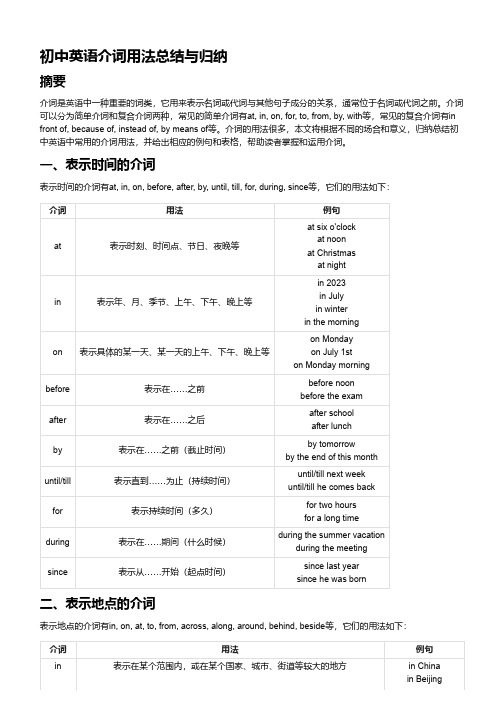
初中英语介词用法总结与归纳摘要介词是英语中一种重要的词类,它用来表示名词或代词与其他句子成分的关系,通常位于名词或代词之前。
介词可以分为简单介词和复合介词两种,常见的简单介词有at, in, on, for, to, from, by, with等,常见的复合介词有in front of, because of, instead of, by means of等。
介词的用法很多,本文将根据不同的场合和意义,归纳总结初中英语中常用的介词用法,并给出相应的例句和表格,帮助读者掌握和运用介词。
一、表示时间的介词表示时间的介词有at, in, on, before, after, by, until, till, for, during, since等,它们的用法如下:介词用法例句at表示时刻、时间点、节日、夜晚等at six o'clock at noonat Christmas at nightin表示年、月、季节、上午、下午、晚上等in 2023in Julyin winterin the morningon表示具体的某一天、某一天的上午、下午、晚上等on Mondayon July 1ston Monday morningbefore表示在……之前before noon before the examafter表示在……之后after school after lunchby表示在……之前(截止时间)by tomorrowby the end of this monthuntil/till表示直到……为止(持续时间)until/till next week until/till he comes backfor表示持续时间(多久)for two hours for a long timeduring表示在……期间(什么时候)during the summer vacation during the meetingsince表示从……开始(起点时间)since last year since he was born二、表示地点的介词表示地点的介词有in, on, at, to, from, across, along, around, behind, beside等,它们的用法如下:介词用法例句in表示在某个范围内,或在某个国家、城市、街道等较大的地方in Chinain Beijing介词用法例句in ZhongshanRoadon表示在某个表面上,或在某个楼层、台阶等较小的地方,或在某个方位上on the wall on the secondflooron the left/rightat 表示在某个具体的位置或地点,或在某个机构、场所等较小的地方,或表示靠近、附近等at the cornerat schoolat the bus stopto表示朝向某个方向或地点,或表示到达某个地点(范围之外)to the east to Japan to schoolfrom表示从某个地点出发或离开(范围之外)from home from Shanghai from Chinaacross表示横穿或穿过(从一边到另一边)across the street across the riveralong表示沿着或顺着(在一边)along the road along the riveraround表示围绕或环绕(在四周)around the lake around the worldbehind表示在……后面behind the door behind himbeside表示在……旁边beside the window beside her三、表示方向的介词表示方向的介词有to, from, into, out of, onto, off, up, down, through等,它们的用法如下:介词用法例句to表示朝向某个方向或地点,或表示目的地He is going to Beijing. She gave the book to me.from表示从某个方向或地点出发或离开,或表示来源He came from the south. This is a gift from my friend.into表示进入某个范围或空间(由外到内)He jumped into the water. She put the flowers into the vase.out of表示离开某个范围或空间(由内到外)He ran out of the room. She took the book out of the bag.onto表示移动到某个表面上(由低到高)He climbed onto the roof. She threw the ball onto the ground.off表示从某个表面上移开(由高到低)He fell off the bike. She took off her hat.up表示向上移动(由低到高)He went up the hill.介词用法例句She climbed up the ladder.down表示向下移动(由高到低)He came down the stairs. She slid down the slide.through表示穿过某个空间或物体(从一端到另一端)He walked through the forest. She looked through the window.四、表示方式、手段、工具的介词表示方式、手段、工具的介词有by, with, in, on等,它们的用法如下:介词用法例句by 表示交通工具、方式、方法等,或表示被动语态的动作执行者,或表示时间的截止点,或表示计量单位等by busby mistakeby himby tomorrowby weightwith 表示使用某种工具、器具、材料等,或表示伴随的人或物,或表示具有某种特征、状态等,或表示原因、理由等with a knifewith hisparentswith long hairwith joyin 表示使用某种语言、文字、颜色等,或表示穿着某种衣服,或表示处于某种状态、情况等,或表示在某种范围内等in Englishin black andwhitein a red dressin a hurryin generalon 表示使用某种电子设备、媒体等,或表示依靠某种力量、条件等,或表示以某种方式等,或表示参与某种活动等on TVon footon fireon dutyon holiday五、表示原因、目的、结果的介词表示原因、目的、结果的介词有for, at, from, of, with, by, because of, owing to, thanks to, out of, through等,它们的用法如下:介词用法例句for 表示原因、理由,常与sorry, famous, punish, praise, thank, blame等连用,也表示目的、意图,常与hope, wish, wait, look, come, go等连用,也可以表示用途、功能等for peacefor helpfor a walkfor funfor cutting paperat表示目的、意图,常与surprised, shocked, amazed, good, bad等连用,也可以表示针对、针对性等at his words at the news at math介词用法例句at solvingproblemsfrom 表示结果、效果,常与different, far, free, safe等连用,也可以表示来源、出发点等from the picturefrom now onfrom dangerfrom birthof 表示原因、理由,常与afraid, proud, sure, tired等连用,也可以表示所属、属性、特征等of the darkof himof the resultof his workwith 表示原因、理由,常与pleased, satisfied, angry, happy等连用,也可以表示伴随、方式、工具等with the answerwith himwith a smilewith a knifeby 表示方式、方法、手段等,也可以表示被动语态的动作执行者,或表示时间的截止点,或表示计量单位等by doing thisby himby tomorrowby weightbecauseof 表示原因、理由,相当于一个从句,后面接名词或代词等because of therainbecause of thatowing to表示原因、理由,相当于一个从句,后面接名词或代词等owing to the trafficjamowing to hisillnessthanks to表示原因、理由,含有感激或讽刺的意味,后面接名词或代词等thanks to yourhelp thanks to his carelessnessout of表示原因、理由,含有出于某种动机或感情的意味,后面接名词或代词等out of curiosity out of pitythrough表示原因、理由,含有经过某种过程或方式的意味,后面接名词或代词等through hard work through a window六、表示对象、范围的介词表示对象、范围的介词有of, for, about, with, to, from, among, between等,它们的用法如下:介词用法例句of表示所属、属性、特征等,也可以表示分离、脱离等the color of the skya cup of teaa friend of mineget rid of itfor表示目标、对象、受益者等,也可以表示目的、原因等 a gift for youa seat for twoa doctor for the poora room for rentabout表示主题、内容、话题等,也可以表示大约、左右等a book about history tell me about yourself about ten minuteswith表示伴随、陪同等,也可以表示方式、工具等stay with mea man with glasses speak with a loud voice cut it with a knifeto表示方向、目的地等,也可以表示对象、接受者等go to school fly to London say hello to him give it to herfrom表示来源、出发点等,也可以表示对象、对比者等come from Chinaa letter from my father different from youlearn from himamong表示在三个或三个以上的人或物之间(内部)share it among yourselves a flower among the grassbetween表示在两个人或物之间(内部或外部)sit between thema river between two mountains七、其他常用的介词除了上述介词外,还有一些其他常用的介词,如as, like, except, without, beyond, above, below, over, under等,它们的用法如下:介词用法例句as表示身份、职业、角色等,也可以表示方式、方法、程度等as a teacher as usual as you know as well aslike表示相似、类似等,也可以表示喜欢、喜爱等like a birdlike father, like sonI like music.except表示除……之外(不包括)everyone except me every day except Sundaywithout表示没有、缺少等without money without water without a wordbeyond表示超出、超过等beyond the wall beyond my expectation beyond controlabove表示在……之上(不接触)above the ground above sea levelabove allbelow表示在……之下(不接触)below the surface below zero below averageover表示在……之上(覆盖或接触)over the bridge over his head over the phoneunder表示在……之下(覆盖或接触)under the tree under his arm under the weather。
介词in,on.at,for.with,by,of的基本用法

介词用法知多少介词是英语中最活跃的词类之一。
同一个汉语词汇在英语中可译成不同的英语介词。
例如汉语中的“用”可译成:(1)用英语(in English);(2)用小刀(with a knife);(3)用手工(by hand);(4)用墨水(in ink)等。
所以,千万不要以为记住介词的一两种意思就掌握了这个介词的用法,其实介词的用法非常广泛,搭配能力很强,越是常用的介词,其含义越多。
下面就简单介绍几组近义介词的用法及其搭配方法。
一. in, to, on和off在方位名词前的区别1. in表示A地在B地范围之内。
如:Taiwan is in the southeast of China.2. to表示A地在B地范围之外,即二者之间有距离间隔。
如:Japan lies to the east of China.3. on表示A地与B地接壤、毗邻。
如:North Korea is on the east of China.4. off表示“离……一些距离或离……不远的海上”。
如:They arrived at a house off the main road.New Zealand lies off the eastern coast of Australia.二. at, in, on, by和through在表示时间上的区别1. at指时间表示:(1)时间的一点、时刻等。
如:They came home at sunrise (at noon, at midnight, at ten o’clock, at daybreak, at dawn).(2)较短暂的一段时间。
可指某个节日或被认为是一年中标志大事的日子。
如:He went home at Christmas (at New Year, at the Spring Festival, at night).2. in指时间表示:(1)在某个较长的时间(如世纪、朝代、年、月、季节以及泛指的上午、下午或傍晚等)内。
哪些形容词后习惯接介词of,to,for,with,in 英语习惯用法
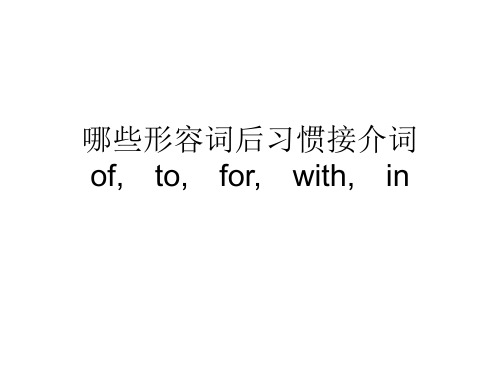
• 16)表示“厌恶”、“讨厌”、“反感”的形容词
– Abominable可恶的; antipathetic厌恶的; offensive令人讨厌的; repellent令
• 17)表示“相同”、“相等”、“相似”、“不相似”的形容词
– Analogous相似的; comparable相等的; dissimilar不相似的; similar相似的; equivalent相等的; …
• 2)表示“反对”、“反抗”、“对抗”、“对立”、“相反”、 “矛盾”的形容词
– Antipodal恰好相反的; antithetic对立的; contradictory矛盾的; contrary相反 的; cross相反的; objectionable反对的; resistant对抗的;…
• 3)表示“友好”、“不友好”、“敌对”、“好客”、“不好 客”、“热情”、“冷漠”的形容词
– Adverse不友好的; courteous有礼貌的; disrespectful无理的; respectful尊 敬别人的; friendly友好的; unfriendly不友好的; hospitable好客的; inhospitable不好客的; hostile有敌意的; impolite无礼貌的; polite有礼貌的; indifferent冷漠的; uncivil失礼的; uncourteous无理的; …
• 13)表示“典型”、“不典型”、“有特点”、“无特点”的形 容词
– Atypical不典型的; typical典型的; characteristic有特点的; uncharacteristic 无特点的;…
• 14)表示“产生”、“引起”的形容词
– Creative产生的; fertile多产的; productive产生的; provocative引起的;…
英语固定句式和to、with、of的用法
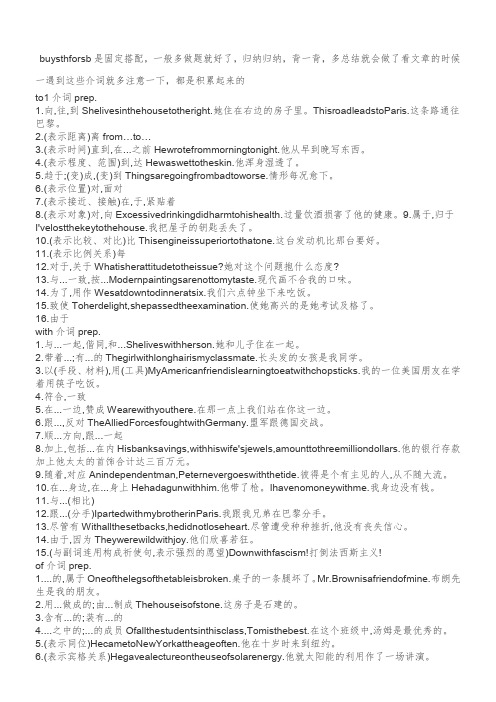
64.takecareof照顾=lookafter
65.makesb.dosth.迫使某人做某事
66.tellsb.todosth.告诉某人做某事
67.bestwishesforsb.(sth)向某人或某事致以良好的祝愿
6.MayIdosth.?我可以做某事吗?
7.likedoingsth.喜欢做某事
8.callsb.(sth.)把某人/物叫。。。
9.Wouldlikesb.todosth.愿意叫某人做某事
10.Whydon’tyoudosth.为何不做某事
11.Whynotdosth.
12.helpsb.withsth.帮助某人做某事=helpsb.(to)dosth.
14.由于,因为Theywerewildwithjoy.他们欣喜若狂。
15.(与副词连用构成祈使句,表示强烈的愿望)Downwithfascism!打倒法西斯主义!
of介词prep.
1....的,属于Oneofthelegsofthetableisbroken.桌子的一条腿坏了。Mr.Brownisafriendofmine.布朗先生是我的朋友。
6.(表示位置)对,面对
7.(表示接近、接触)在,于,紧贴着
8.(表示对象)对,向Excessivedrinkingdidharmtohishealth.过量饮酒损害了他的健康。9.属于,归于I'velostthekeytothehouse.我把屋子的钥匙丢失了。
10.(表示比较、对比)比Thisengineissuperiortothatone.这台发动机比那台要好。
18.begoodat擅长=dowellin
19.lovetodosth.爱好做某事
介词in,on.at,for.with,by,of的基本用法之欧阳语创编

介词用法知多少介词是英语中最活跃的词类之一。
同一个汉语词汇在英语中可译成不同的英语介词。
例如汉语中的“用”可译成:(1)用英语(in English);(2)用小刀(with a knife);(3)用手工(by hand);(4)用墨水(in ink)等。
所以,千万不要以为记住介词的一两种意思就掌握了这个介词的用法,其实介词的用法非常广泛,搭配能力很强,越是常用的介词,其含义越多。
下面就简单介绍几组近义介词的用法及其搭配方法。
一. in, to, on和off在方位名词前的区别1. in表示A地在B地范围之内。
如:Taiwan is in the southeast of China.2. to表示A地在B地范围之外,即二者之间有距离间隔。
如:Japan lies to the east of China.3. on表示A地与B地接壤、毗邻。
如:North Korea is on the east of China.4. off表示“离……一些距离或离……不远的海上”。
如:They arrived at a house off the main road.New Zealand lies off the eastern coast of Australia.二. at, in, on, by和through在表示时间上的区别1. at指时间表示:(1)时间的一点、时刻等。
如:They came home at sunrise (at noon, at midnight, atten o’clock, at daybreak, at dawn).(2)较短暂的一段时间。
可指某个节日或被认为是一年中标志大事的日子。
如:He went home at Christmas (at New Year, at the Spring Festival, at night).2. in指时间表示:(1)在某个较长的时间(如世纪、朝代、年、月、季节以及泛指的上午、下午或傍晚等)内。
about,with,of,for,to用法
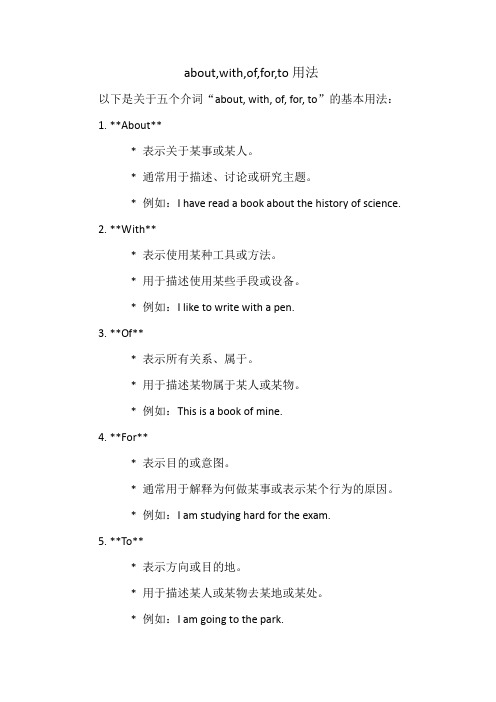
about,with,of,for,to用法
以下是关于五个介词“about, with, of, for, to”的基本用法:1. **About**
* 表示关于某事或某人。
* 通常用于描述、讨论或研究主题。
* 例如:I have read a book about the history of science.
2. **With**
* 表示使用某种工具或方法。
* 用于描述使用某些手段或设备。
* 例如:I like to write with a pen.
3. **Of**
* 表示所有关系、属于。
* 用于描述某物属于某人或某物。
* 例如:This is a book of mine.
4. **For**
* 表示目的或意图。
* 通常用于解释为何做某事或表示某个行为的原因。
* 例如:I am studying hard for the exam.
5. **To**
* 表示方向或目的地。
* 用于描述某人或某物去某地或某处。
* 例如:I am going to the park.
这五个介词的用法相当复杂,因此建议查阅英语语法书籍或咨询英语教师,以获取更详细和准确的信息。
与for,with, from, on, about, of等介词的用法
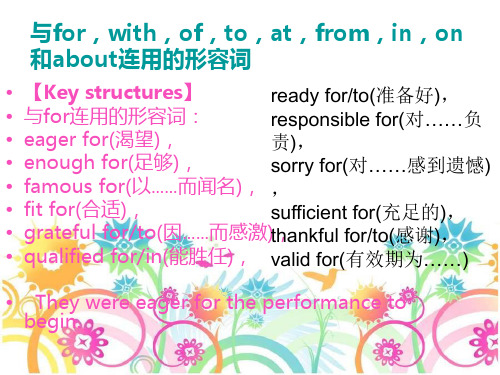
• • • • • • • • • 【Key structures】 ready for/to(准备好), 与for连用的形容词: responsible for(对……负 eager for(渴望), 责), enough for(足够), sorry for(对……感到遗憾) famous for(以……而闻名), , fit for(合适), sufficient for(充足的), grateful for/to(因……而感激), thankful for/to(感谢), qualified for/in(能胜任), valid for(有效期为……) They were eager for the performance to begin.
inferior to(劣于……), liable to(对……有义务的), new to(对……没有经验), obedient to(对……服从), obvious to(对……清楚的), polite to(对……有礼貌), previous to(先于), rude to(对……粗暴无礼), sensitive to(对……敏感), similar to(与……相似), Though the bicycle is old, it is very dear to me. useful to(对……有用)
• • • • •
与from连用的形容词: away from(距……远的), different from(与……不同的), far from(远离),far from comfortable while being confined to the wooden box. • 那人被闷在木箱里时一点儿也不舒服。
常用介词用法(for_to_with_of)
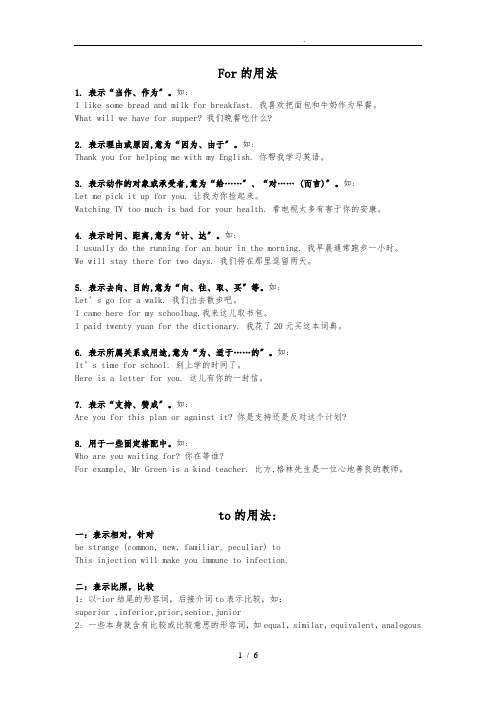
For的用法1. 表示“当作、作为〞。
如:I like some bread and milk for breakfast. 我喜欢把面包和牛奶作为早餐。
What will we have for supper? 我们晚餐吃什么?2. 表示理由或原因,意为“因为、由于〞。
如:Thank you for helping me with my English. 你帮我学习英语。
3. 表示动作的对象或承受者,意为“给……〞、“对…… (而言)〞。
如:Let me pick it up for you. 让我为你捡起来。
Watching TV too much is bad for your health. 看电视太多有害于你的安康。
4. 表示时间、距离,意为“计、达〞。
如:I usually do the running for an hour in the morning. 我早晨通常跑步一小时。
We will stay there for two days. 我们将在那里逗留两天。
5. 表示去向、目的,意为“向、往、取、买〞等。
如:Let’s go for a walk. 我们出去散步吧。
I came here for my schoolbag.我来这儿取书包。
I paid twenty yuan for the dictionary. 我花了20元买这本词典。
6. 表示所属关系或用途,意为“为、适于……的〞。
如:It’s time for school. 到上学的时间了。
Here is a letter for you. 这儿有你的一封信。
7. 表示“支持、赞成〞。
如:Are you for this plan or against it? 你是支持还是反对这个计划?8. 用于一些固定搭配中。
如:Who are you waiting for? 你在等谁?For example, Mr Green is a kind teacher. 比方,格林先生是一位心地善良的教师。
- 1、下载文档前请自行甄别文档内容的完整性,平台不提供额外的编辑、内容补充、找答案等附加服务。
- 2、"仅部分预览"的文档,不可在线预览部分如存在完整性等问题,可反馈申请退款(可完整预览的文档不适用该条件!)。
- 3、如文档侵犯您的权益,请联系客服反馈,我们会尽快为您处理(人工客服工作时间:9:00-18:30)。
For的用法1. 表示“当作、作为”。
如:I like some bread and milk for breakfast. 我喜欢把面包和牛奶作为早餐。
What will we have for supper? 我们晚餐吃什么?2. 表示理由或原因,意为“因为、由于”。
如:Thank you for helping me with my English. 谢谢你帮我学习英语。
3. 表示动作的对象或接受者,意为“给……”、“对…… (而言)”。
如:Let me pick it up for you. 让我为你捡起来。
Watching TV too much is bad for your health. 看电视太多有害于你的健康。
4. 表示时间、距离,意为“计、达”。
如:I usually do the running for an hour in the morning. 我早晨通常跑步一小时。
We will stay there for two days. 我们将在那里逗留两天。
5. 表示去向、目的,意为“向、往、取、买”等。
如:Let’s go for a walk. 我们出去散步吧。
I came here for my schoolbag.我来这儿取书包。
I paid twenty yuan for the dictionary. 我花了20元买这本词典。
6. 表示所属关系或用途,意为“为、适于……的”。
如:It’s time for school. 到上学的时间了。
Here is a letter for you. 这儿有你的一封信。
7. 表示“支持、赞成”。
如:Are you for this plan or against it? 你是支持还是反对这个计划?8. 用于一些固定搭配中。
如:Who are you waiting for? 你在等谁?For example, Mr Green is a kind teacher. 比如,格林先生是一位心地善良的老师。
尽管for 的用法较多,但记住常用的几个就可以了。
to的用法:一:表示相对,针对be strange (common, new, familiar, peculiar) toThis injection will make you immune to infection.二:表示对比,比较1:以-ior结尾的形容词,后接介词to表示比较,如:superior ,inferior,prior,senior,junior 2: 一些本身就含有比较或比拟意思的形容词,如equal,similar,equivalent,analogousA is similar toB in many ways.3:表示一些先后顺序的形容词,如:second、next,4: to也偶尔出现在个别动词之后,与动词形成固定词组,表示比较,如:prefer to,compare to,in contrast tocompare to sth.表示比喻或比拟,而compare with sth.表示比较,如:World is usually compared to a stageCompared with his past,he has changed a lot.Prefer的正确句型是:prefer A to B或prefer doing A to doing B,但当prefer后接动词不定式时,表示比较的介词to就要改成rather than ,如:The undaunted soldier preferred death to surrender.Many people prefer spending money to earning money.They prefer to pursue careers rather than remain home as house wives.5: to与及个别的名词构成比较之意,如:alternativeGoing to an under water concert is a great alternative to going to dinner.三: 表示修饰关系1: 表示回复,反应意思的词,如:answer to question, solution to problem,response to inquiry,reaction to proposal,reply to letter6: 表示与书籍,文本相关的词,如:introduction to passage.7: 表示恭喜或是祝贺,如:The director proposed a toast to the health of the guests.Let’s drink to Dick’s success in business8: 另外还有一些名词符合这种用法,有的具有两者息息相关,缺一不可的含义.如:key to door,invitation to party,四: to还具有依据,伴随,和着节奏的含义,如:sing to piano, chance to the tune, stamp to the rhythm of the song, add salt to taste(一):表示相关联,相连接,如:be related to,be relative to,in relation to ,link to Investigate all the facts related to the problem.People often linked walth to happiness.(二):表示反对和赞同。
1:to引导的表示反对,抗拒,对抗意义的词组。
Be opposed to,be oppsist to,be contrary to,be adverse to,be resistant to ,object to,oppose to,2: to引导的表示同意,赞同意义的词组:consent to,subseribe to,The employer consented to give him a salary raise.表示调整,使符合,使适应的含义,如:adapt to,commodate to, adjust to,conform to,habituate to,fit to,suit to,correspond to,cater toShe tried to habituate herself to the style of plain living.Your action should conform to the interests of the people.3: 表示投降,屈服,服从的含义,如:be subject to,be subordinate to,submit to,subject to,surrender to,give in to,confess to,admit to.The minority is subordinate to the majority少数服从多数五: 表示趋势或倾向,如:tend to,be prone to,be inclined to,be apt to,be liable to He’s liable to seasickness.You are liable to come to wrong conclusion.七: 表示约束,局限,如:limit to,confine to,resrict toHe’s confined to the house by illness.He confined his remarks to scientific mangement.八: 表示一种习惯或是一种适应性,如:get (be) to,used to,Finally,the students got used to my teaching method.九: 表示起因和原由,如:owing to,due to,thanks to,attribute to,come down toThe flight was cancelled due to the thick fog.The famous artist attributed his success to his wife.十: 表示目的或结果,如:aim to,lead to,give rise toI aim to be an excellent college teacher.His conceit lead to his failure.十二: 表示数量上的积累或增加,如:in addition to,add to,amount toIn addition to relief supplies,he also presented with some money.十三: 表示全身心投入的含义,如:be addicted to,contribute to,devote to,commit to He is determined to devote all his life to his.十四: 表示展望或是回顾,如:look forward to反date back toThe church dates back to the 13th century.十五: 表示方位概念.如:close to,next toI don’t like wool next to my skin.十七: 表示有关注,关于: as to,with regard to十八: 表示关注或重视,如:pay attention to,attach to,We should attach primary importance to job training.二十: 表示应该或必须含义的句式, 如:I t’s time to get up.We are supposed to get here at seven.It’s up to this country to ban nuclear weapons.常用词组respond to(反应), appeal to(吸引), catch on to(理解), listen to (收听),used to(过去常常), give birth to,attend to(照料), see to(负责), be entitled to(有权), belong to(属于), come to(苏醒), stand up to(勇敢面对), help oneself to(请自便), refer to,to the point(切题),with的用法1、以, 用, 同...,由于, 和...一致, 赞成, 关于, 就talk with a friend 与朋友谈话learn farming with an old peasant 跟老农学习种田fight [quarrel, argue] with sb. 跟某人打架[争吵, 辩论]2、说明表示动作的词, 表示伴随]随着, 和...同时change with the temperature 随着温度而变化increase with years 逐年增加be up with the dawn 黎明即起W-these words he left the room. 他说完这些话便离开了房间。
